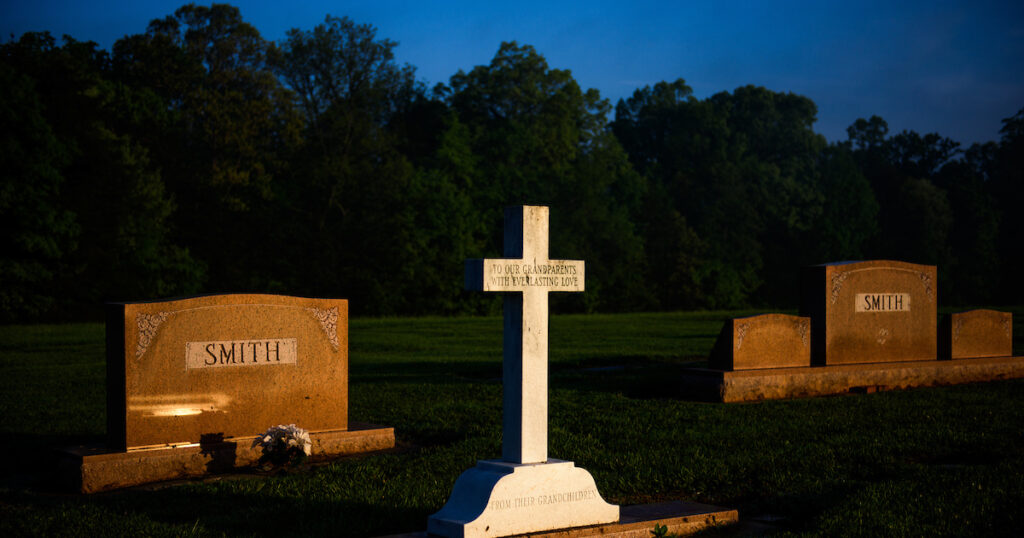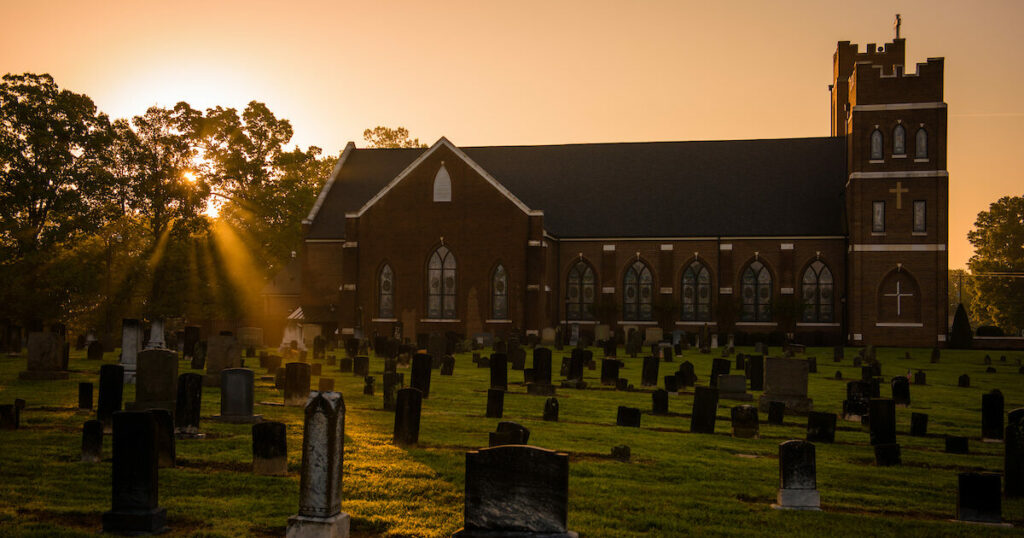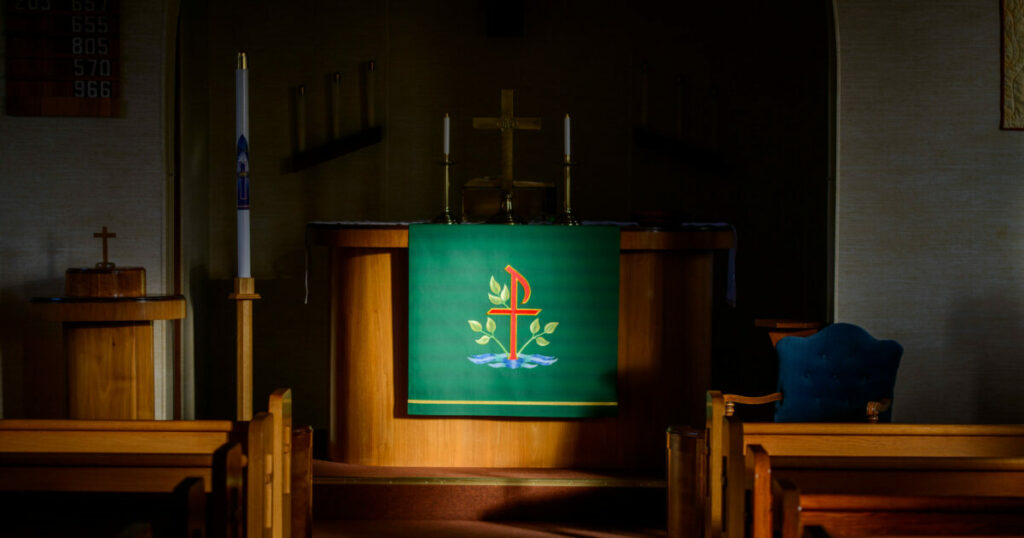“Deliver me from my enemies, O my God; protect me from those who rise up against me” (Ps. 59:1).
We do not often think of a funeral as the best time for reflection on the Small Catechism. However, when I conducted my first funeral as a young pastor, I was struck by just how appropriate Luther’s explanation to the Seventh Petition of the Lord’s Prayer was for just such an occasion. I not only incorporated it into my first funeral sermon but also led the congregation in a recitation of it then and at every subsequent funeral service.
The Seventh Petition
But deliver us from evil.
What does this mean?
We pray in this petition, in summary, that our Father in heaven would rescue us from every evil of body and soul, possessions and reputation, and finally, when our last hour comes, give us a blessed end, and graciously take us from this valley of sorrow to Himself in heaven.
The Seventh Petition summarizes the Lord’s Prayer. It also summarizes everything you as a dear child have asked your dear Father throughout your entire life. Every time we conclude this prayer, we ask to be delivered from evil and all that it means, including sin, the evil one and death.
When our Lord taught His disciples how to pray and gave them this prayer (Matt. 5:9–13; Luke 11:1–4), little did they know that it would be on their lips and the lips of Christ’s followers from that moment until His return. Surely no other prayer has been prayed more often in the history of mankind.
Have you ever wondered how many times you have prayed the Lord’s Prayer? There is perhaps no exact way to figure this out, but Luther mapped out some basic guidelines in the “Daily Prayer” portion of the Small Catechism. If you followed these completely, you would pray it every morning and evening, and before and after every meal. You would easily pray it more than 50 times a week and well over a million times in your life. And whether or not you think of your mortality each time, whenever you pray it you ask your Father to give you a blessed end when you die.
Of course, death is always a shock, even though we all know that we will eventually die: “for the wages of sin is death” (Rom. 6:23). Nonetheless, we have seen more than our share of sickness, death and destruction of lives over the last several months. This time has truly been a trial for many.
How does Jesus confront death? How did He handle funerals? The One who tutored us in prayer also tackled death directly so that our prayers for a blessed end would not be in vain. Consider this account of when Jesus came upon a funeral procession:
As he drew near to the gate of the town, behold, a man who had died was being carried out, the only son of his mother, and she was a widow, and a considerable crowd from the town was with her. And when the Lord saw her, he had compassion on her and said to her, “Do not weep.” Then he came up and touched the bier, and the bearers stood still. And he said, “Young man, I say to you, arise.” And the dead man sat up and began to speak, and Jesus gave him to his mother. (Luke 7:12–15)
Notice how Jesus addressed the enemy. Like a good field general, He identified it correctly. Luke described the son of the widow as a “dead man.” No beating around the bush here. No euphemisms to cover anything up. Just the hard truth — inside that coffin was a dead man. We should not avoid or ignore the realities of our enemy death. Yes, we can cover up the truth with embalming, heavy makeup and syrupy sweet music on bad funeral home instruments. We can use green artificial turf and flowers to cover up the gaping hole of a grave, but the bottom line is that, like the young man, we too will have a funeral procession one day.
It was for this reason that Jesus came. God sent His only Son on a divine rescue mission to deal with sin, death and the power of the devil. Jesus did not retreat, dodge or ignore death. Rather, Jesus walked straight up to this open coffin and touched it, and those carrying the dead man stood still. Jesus stopped the procession of death dead in its tracks. He engaged death hand to hand. And notice that He never used gloves to protect Himself from the end result of sin.
With this touch of the coffin, Jesus put Himself in the place of the widow. He shared in her heartache and the heartache of all who have lost loved ones; as it is written, “He was … a man of sorrows and acquainted with grief” (Is. 53:3). By touching the casket, Jesus also put Himself in the place of the widow’s only son. Jesus did exactly what the priest and Levite would not do in the parable of the Good Samaritan (Luke 10:25–37), and what, according to Old Testament law, would make Him unclean. By touching the bier on which young man’s dead body lay, Jesus became ceremonially unclean. Jesus allowed that uncleanness to come upon Him. But that’s not all. Not only did Jesus touch and receive this man’s death, He also transferred to the young man His own life in exchange, to make the young man clean and whole.
You do not have an antiseptic Savior; He did the opposite of socially distancing Himself from you. Your Savior is not concerned about receiving your germs. He is not concerned about mixing His blood with yours. He came to shed His blood for you, and even today continues to give you His body and blood for the forgiveness of your sins.
Jesus, who knew no sin, became a dead man to save this young man and all of you as well. On the cross, Jesus absorbed your death into His own body to save you from it. Jesus allowed death to pass from you to Him so that you would be restored to life, cleansed and made whole. Since Jesus has shared in your death, He has redeemed you from death and gives you now to share in His bodily resurrection to life. As Paul reminds us in Romans 6:5, “If we have been united with him in a death like his, we shall certainly be united with him in a resurrection like his.”
What a comfort it is to know that in Jesus, God your Father has rescued you from your sin and death even before you could utter a prayer, say a word or begin to thank Him. And now He hears and answers your prayers in, with and through Jesus.
When Jesus tutored His disciples in how to pray, He didn’t teach them to pray for a blessed end that He could not make a reality. He declared in advance outside Nain what He accomplished outside Jerusalem. And His disciples were His witnesses.
In His prayer, Jesus prepared His disciples for their own death, and all that they would face. We are preparing for death too, every time we pray the Lord’s Prayer. We know death is coming; it should not surprise us when a Christian dies.
We have also been armed with more than just words. In recent months, personal protective equipment (PPE) has become the most coveted piece of clothing in the world. You have something better. You have been given the greatest PPE that the world has ever seen. It cannot be purchased at a big box store or supplied directly by the government, but it is the most priceless protection of all — your Baptism into Christ. Your sins are forgiven, the devil has been routed and the last enemy — death — has been destroyed. You are clothed with Christ in your Baptism, and you have been given the words of your Lord and direct access to your heavenly Father in this prayer.
So pray. Pray “but deliver us from evil” in the absolute confidence that our Father in heaven will keep His word. He already has. And just as you have prayed, or will pray, perhaps a million times, He will take you from this valley of sorrow and give you a blessed end.
“The Lord will keep you from all evil; he will keep your life. The Lord will keep your going out and your coming in from this time forth and forevermore” (Ps. 121:7–8).
The Rev. Marcus Zill is director of LCMS Campus Ministry & LCMS U.





